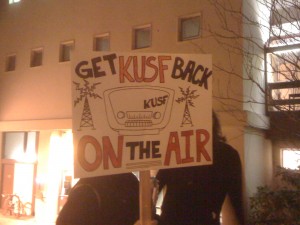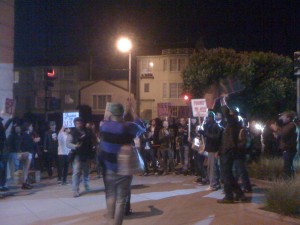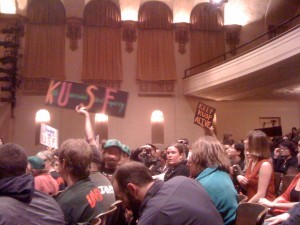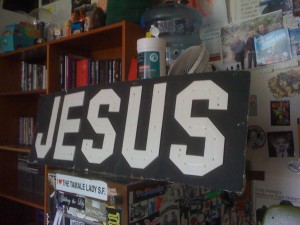Last night KUSF DJs, staff members, alumni and listeners (including students, University of San Francisco faculty, and DJs from other local college radio stations) came out to University of San Francisco in an attempt to get some answers from USF about the sudden shut-down of the college radio station on Tuesday at 10am during DJ Schmeejay’s show. The 478 seat Presentation Theater was filled to capacity with supporters eager to pose questions to USF President Rev. Stephen A. Privett.
Prior to the scheduled 7pm meeting, people gathered in front of Phelan Hall (where KUSF is housed) with home made signs and caps and shirts emblazoned with “Save KUSF.” The bell tower overlooking campus ominously chimed, while people swapped stories about the surprise announcement of the station sale to University of Southern California for its new Classical Public Radio Network.
In the background, campus security turned people away from Phelan Hall and also watched over the growing crowd from atop a neighboring building’s roof. As it got closer to 7pm, the large group walked over to Presentation Theater, while chanting against the station sale. At one point a motorcycle escort even helped to block off Turk Street, while the group crossed over from the main campus. Upon arriving in front of Presentation Theater, one of KUSF’s Music Directors, Irwin Swirnoff, led the crowd in a vocal protest before the assembled entered the theater. As people arrived, they were handed slips of paper, which could be filled out with a name and relationship to KUSF if one wanted to ask a question during the meeting.
Before the floor was opened to questions, USF President Privett invited those in the room to “pray with him,” as is the tradition at USF at meetings such as these. It turned out to be a telling way to begin the discussion, as many questions later would focus on how the handling of the KUSF sale was in keeping with Jesuit values.
After thanking the volunteers and staff of KUSF for their service, he said, “It’s very clear to me that there is justifiable anger and disappointment with the decision that I made…” He added, “I don’t expect or anticipate that you are going to agree with me…,” but asked that people listen to his perspective. Privett emphasized that his “primary responsibility” is to students and to ensure that “all of the university’s resources are directed…to a quality education…to our students….”
With that, Privett opened the floor to questions. Names were called from the slips of paper that were turned in, so it felt fairly random as far as who was given an opportunity to share a comment or ask a question. Although the range of questions and comments were impressive, emotional, and intelligent; for the most part the answers stuck to the party-line that was communicated in Privett’s opening statement and in USF’s official press release from Tuesday. Despite that, there were some surprising revelations and incisive questions that no doubt left Privett thinking in a different way about how he’s handled KUSF.
San Francisco listeners talked about how KUSF has been an important resource for the community and said that they will miss being able to hear the station over the FM airwaves.
Current KUSF DJs talked about their dismay over how the plans to sell the station were kept secret and argued that they were made to feel like “criminals” by the administration when they were simply trying to get answers after the station was abruptly shut down.
Chad Heimann, a KUSF DJ and a junior Media Studies major at USF, said that “yesterday when I was at KUSF and thrown out…I didn’t feel like a student, I felt like a criminal.” He explained to Privett that he was also a campus tour guide and that he refused to give a tour the day after the shut-down because he didn’t “want to have to say anything bad about the university.” He also expressed how important the non-student volunteers and the San Francisco community are to KUSF, arguing, “I know for a fact…we can’t do this without the community…I can’t run a radio station without the community…I love them and I learn from them.” He also told Privett that right now he feels “ashamed” to attend USF and said, “I feel so betrayed by the school that I love so much.”
Despite comments like these, Privett downplayed the current role of students at KUSF, at one point saying that only 10 students worked at the station. He quickly recanted that after people questioned him and then seemed to state that perhaps KUSF had a staff of 10 percent students (a point that someone later referred to as the “myth of the 10 per cent”).
Although Previtt stated that, “KUSF will continue with online programming,” he also said that “KUSF will go back to its roots” as a “student enterprise” and a “learning laboratory.” No mention was made as to whether or not the station would be open to community members as it is now. He was vague about the details on how the “new” KUSF would be programmed, stating that those questions will be decided later by the Dean and faculty members who will be charged with designing a curriculum for the station. On that note, USF Media Studies professor Dorothy Kidd chimed in, saying that she was upset that faculty members in her department were also left in the dark about the sale, saying that if the new direction of the station is as a “teaching facility,” then, “Why is the first time that I learned about this decision, last night? I am a teacher…” She added that, “a lot of faculty members are very upset with this decision.”
I was lucky to have my name called, so asked Privett a few questions about both the sale and the future of the station. I questioned him about how the offer arrived at USF and whether or not the station was officially for sale. He said that they had not put themselves up for sale and that an offer to buy the station came to them through a broker 3 to 4 months ago. After signing a non-disclosure agreement, he learned who the suitor was (University of Southern California). To me this was intriguing news, as earlier in the day Brenda Barnes from KUSC stated that her priority was to expand the reach of Classical Public Radio Network by seeking out available frequencies in the Bay Area. She emphasized that they were only approaching stations that are already for sale; so it left me wondering if that was the case with KUSF. Many have pointed out that KUSF has received purchase offers in the past, including one from USC that was rejected a few years ago. So, perhaps that indicates that KUSF has been on the market all this time, even though Previtt denied it tonight.
I also asked about the future of Cultural programming on KUSF (for more details on the program schedule at the old KUSF, see my “station field trip” article) and about the rumored plans that the station will be moving. Earlier in the day, a KUSF Music Director, Howard Ryan (aka “DJ Schmeejay“) was interviewed on Radio Valencia. He said that the school’s communication about KUSF moving to a streaming station seemed to be giving people the false impression that KUSF as it is today would simply be transitioned to an online-only station. He said that there was talk that the station would move to a new building and that there would be no space for the music library, arguing that, “The cultural programming is probably not going to stay” and “It’s really not at all going to be” like the old KUSF. He guessed that the new station would consist of students playing primarily digital music.
So, after hearing Howard’s words earlier, I asked Privett about the plans for the music library and if it would be retained. He said that it was the property of KUSF and indicated that there would be space for a library in the new location. Later on in the evening he said that the station is moving out of Phelan Hall because the building is being renovated and the campus “needed more beds.” Prior to KUSF’s occupancy, its space in Phelan Hall was used as dorm rooms and the plan is to revert the space back to that purpose. He didn’t indicate where KUSF would be moving.
Howard was also one of the many people to question Privett about morality and the community-oriented ideals of Jesuits, asking, “”How do you feel this business transaction reflects Jesuit ideals?” Privett said that the station was not part of the university’s “core mission,” adding they the school “cannot afford this community service.” Howard then asked why the community wasn’t given the opportunity to make an offer to buy the station and asked Privett to reconsider his decision to sell the station to USC. Despite that plea, Privett remained resolute that his decision will stand.
Although many in the crowd probed Privett about business ethics, the secrecy with which the deal went down and how the sale of the station is in keeping with the stated vision, mission, and values of USF, he said, “This was not a crass business decision about dollars…This was about ensuring that our programs involve students…our primary mission is to our students.”
As the evening wore on he also mentioned that the school wanted to “recoup” both space and monetary resources that went into KUSF. Others countered his statements about the school’s funding of the station, pointing out that KUSF brought in underwriting dollars, donations, and also survived based on the volunteer hours put in by students and community members. People also questioned Privett on why KUSF wasn’t allowed to do fundraisers and why it wasn’t encouraged to become financially self-sufficient.
After about 2 hours of questions, Privett left the stage and Irwin Swirnoff addressed the crowd from the audience, saying, “We asked that a KUSF representative be on stage,” but were denied. So, the meeting ended with many lingering questions on the lips of DJs and listeners. Privett did state that if people had more questions, they were welcome to email him at privett@usfca.edu.
In the meantime, the Save KUSF Facebook page had around 3300 fans at last count, an online petition is circulating, and news and updates are being posted on the website Save KUSF. Behind the scenes DJs and staff are planning their next moves to work to formally protest the sale with the FCC. Stay tuned…







